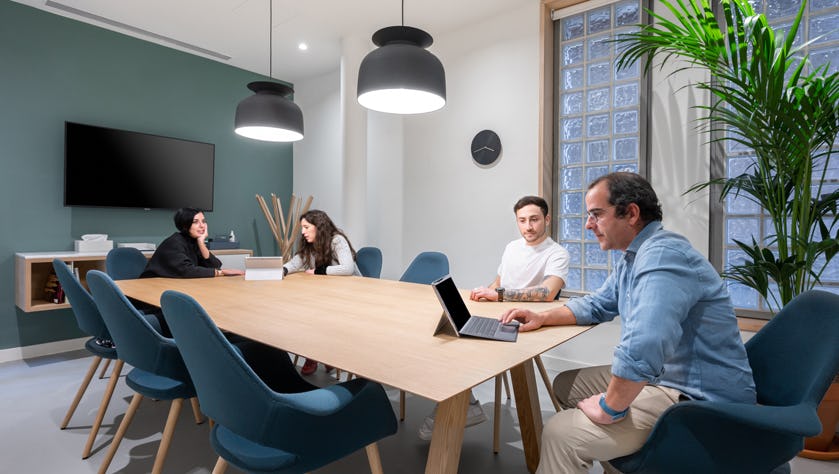
While some aspects of office life may be replicated as we work from home, there are some instances where it can’t be replaced, says Christophe Burckart, General Manager, Spaces France
Do you miss the office? You’re not alone. While there may be some benefits to working from home, most of us still haven’t found satisfactory ways to replicate the social interactions and ‘watercooler moments’ that present opportunities for collaboration with our colleagues during the workday.
We used to spend a lot of time doing it. Pre-pandemic, full-time employees spent an average of 40 hours a week in the workplace, using the time not only to get individual work done, but to chat, brainstorm and connect with our teammates. And these working relationships were important to us: strong bonds with our colleagues have been shown to impact everything from happiness to creativity.
“It’s about more than just ‘getting along’ with a coworker,” says corporate wellness expert Alan Kohll, writing in Forbes. “As humans, we crave contact and connection with other people.”
Creative industries in particular have always benefited from the free-flow of ideas that take place in an office environment. Just take a look at the people and businesses who’ve been using Spaces for years. So what has the impact of Covid-19 and worldwide lockdowns over the last 12 months had?
Christophe Burckart, General Manager, Spaces France, says many customers using Spaces centres in the country have felt isolated and missed working together, side by side and face to face in the same room. So much so, that – rather than there being a decline in interest in returning to the office – there’s been a surge in demand for more flexible, short-term contracts.
“Since the pandemic, our month-to-month contract sales have grown by 40%,” he says. “People working from home want to come back, to share with others, to work together on innovation and creative projects. And the easiest way to do that is in person, in the office.”
A case for collaboration
Research shows the benefits go beyond inspirational brainstorming. Collaborative companies see higher revenues, increased employee retention and faster time to market.
Burckart says the most successful businesses are the ones that are open to ideas and expertise outside of their own teams. Being part of the type of community that exists in a flexible workspace enables professionals to access a wider pool of talent and resources.
He points to Spaces customer AG Digital, which wanted to have its organisation within one of their centres to find ways of working differently and forge new alliances within the broader community. “When you create those ecosystems where different companies and people can work in a collaborative way, then it creates a lot of synergies, a lot of expertise and it creates more business,” explains Burckart.
Burckart points out that Spaces centres were designed for this very purpose: “First, the ‘business club’ concept – a large space that comprises 20% of the total square footage – is at the heart of every centre and is laid out with different areas suited to meeting and collaborating, whether it’s a table where the whole team can work together, a brainstorming room, or a formal seating area.”
Pre-pandemic, and in countries where lockdowns have been lifted, Spaces centres also organise weekly events for customers – both those working remotely and in the office – to network, share knowledge and inspire each other. It might be as laid-back as a coffee morning or as formal as a presentation on anything from a new technology to a better system for organising your taxes.
To further encourage a collaborative spirit, the centres also have a ‘social wall’ screen, which all customers have access to to share ideas and information via a chosen hashtag.
Expecting the unexpected
“One of the biggest pros of office working is the opportunity for the unexpected to happen,” says Burckart. “A walk to the coffee machine could lead to a chance encounter with a potential future business partner, for example. This kind of serendipity is unlikely to occur at home.”
Burckart predicts the office will continue to play an important role for many businesses, but that employees will still work remotely two or three days a week. “The important thing is that conversation around ‘hybrid working’ shouldn’t be limited to the home office,” he says. “Instead, we need to move from the idea of one workplace to a network of workplaces.”
He says Spaces’ parent company, IWG, has understood this idea for many years, ever since 1989, when founder Mark Dixon started growing the business and opening more centres around the world in multiple towns and cities. “He predicted that at one point in time, our customers would be using a network of locations and not just the head office.”
“The way we will use workspace in the future will be very fluid,” he adds. “We want customers to think of Spaces as the ‘cloud’ of workspaces: you can use us anywhere, anytime – and you’ll only pay for what you use.”
How, though, will offices balance the desire of customers to collaborate with the requirement to keep them safe? After all, social distancing guidelines are designed to limit physical contact and keep people apart, not bring them together.
“I think we will find a midpoint and a compromise in the coming months,” says Burckart. In the meantime, he points to all the ways that Spaces has created safe working environments. These include putting in place protocols defined by the health authorities – from deep cleaning and providing PCR tests upon request, to promotion of Covid-19 test and trace apps and mask wearing. “Our goal is to make collaboration as risk-free as possible,” he says.
When it’s time to come back to the office, Spaces will be here waiting for you. Find out how our coworking solutions could help you and your business collaborate more effectively
Share this article
 Read now Five podcasts to supercharge your productivity
Read now Five podcasts to supercharge your productivity
 Read now How to encourage remote teamwork
Read now How to encourage remote teamwork